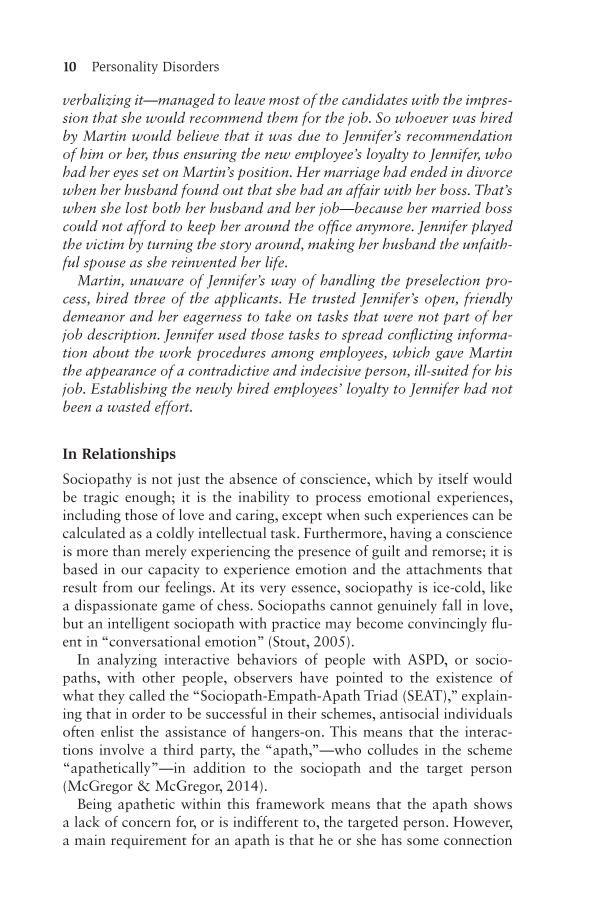10 Personality Disorders verbalizing it—managed to leave most of the candidates with the impres- sion that she would recommend them for the job. So whoever was hired by Martin would believe that it was due to Jennifer’s recommendation of him or her, thus ensuring the new employee’s loyalty to Jennifer, who had her eyes set on Martin’s position. Her marriage had ended in divorce when her husband found out that she had an affair with her boss. That’s when she lost both her husband and her job—because her married boss could not afford to keep her around the office anymore. Jennifer played the victim by turning the story around, making her husband the unfaith- ful spouse as she reinvented her life. Martin, unaware of Jennifer’s way of handling the preselection pro- cess, hired three of the applicants. He trusted Jennifer’s open, friendly demeanor and her eagerness to take on tasks that were not part of her job description. Jennifer used those tasks to spread conflicting informa- tion about the work procedures among employees, which gave Martin the appearance of a contradictive and indecisive person, ill-suited for his job. Establishing the newly hired employees’ loyalty to Jennifer had not been a wasted effort. In Relationships Sociopathy is not just the absence of conscience, which by itself would be tragic enough it is the inability to process emotional experiences, including those of love and caring, except when such experiences can be calculated as a coldly intellectual task. Furthermore, having a conscience is more than merely experiencing the presence of guilt and remorse it is based in our capacity to experience emotion and the attachments that result from our feelings. At its very essence, sociopathy is ice-cold, like a dispassionate game of chess. Sociopaths cannot genuinely fall in love, but an intelligent sociopath with practice may become convincingly flu- ent in “conversational emotion” (Stout, 2005). In analyzing interactive behaviors of people with ASPD, or socio- paths, with other people, observers have pointed to the existence of what they called the “Sociopath-Empath-Apath Triad (SEAT),” explain- ing that in order to be successful in their schemes, antisocial individuals often enlist the assistance of hangers-on. This means that the interac- tions involve a third party, the “apath,”—who colludes in the scheme “apathetically”—in addition to the sociopath and the target person (McGregor & McGregor, 2014). Being apathetic within this framework means that the apath shows a lack of concern for, or is indifferent to, the targeted person. However, a main requirement for an apath is that he or she has some connection
Document Details My Account Print multiple pages
Print
You have printed 0 times in the last 24 hours.
Your print count will reset on at .
You may print 0 more time(s) before then.
You may print a maximum of 0 pages at a time.


























































































































































































































































